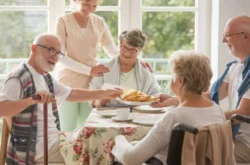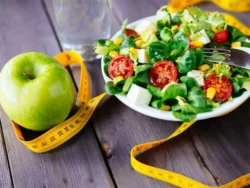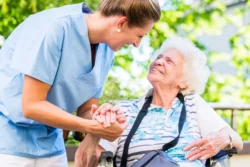When you are responsible for overseeing the health and well-being of an aging loved one, such as a parent or grandparent, one of your top priorities should be ensuring that they are getting the right amount of nutrition from their diet each and every day. Nutritional deficiencies can lead to a great deal of issues regardless of age, but such a topic is particularly important to address in the elderly.
Why is it important?
Improper nutrition can directly result in a decline in health in your loved one. From bone density to their ability to fight off infection, proper nutrition is a key aspect to maintaining a healthy lifestyle for as long as possible. Unfortunately, there are a variety of reasons why your aging loved one might not be getting the nutrition that they need from their diet. It is crucial that you pay attention to their eating habits so that you can identify any issues in this area before things progress to an unhealthy degree.
With that in mind, here are three reasons why your aging loved one might not be getting adequate nutrition from their diet.
1. Dysphagia
If you spend some time with your loved one around meal times and notice that they are staying clear of more solid foods, you might wish to ask them about whether or not they are having difficulty swallowing. They might very well have developed a condition known as dysphagia.
Dysphagia is a condition that results in great difficulty or discomfort in swallowing certain consistencies of food. More often than not, dysphagia is linked to muscular issues. If one or more of the over 20 muscles involved in the process of swallowing becomes damaged or weakened in some way, it can make swallowing incredibly difficult or impossible.
If you discover that your loved one is, in fact, suffering from dysphagia, you might consider helping them to find a consistency of food that works for them. Products like Simply Thick can be a great help in this area.
2. Certain Medications
Another reason why your loved one might be struggling to eat properly is related to their sense of taste. There are certain medications that your loved one might be taking that could very well be negatively impacting their sense of taste.
Some of the most common medications that can have this side effect are those that are prescribed to help manage one’s blood pressure. If your loved one is struggling with a distorted sense of taste that is making food seem unappealing in general, they may very well cease to eat properly entirely.
3. Loneliness
Other reasons for an elderly individual neglecting their diet and nutrition are linked to loneliness and mental health issues. If mealtime is generally one that they spend alone, they can associate negative feelings and emotions with food. If you sense that this might be the case with your loved one, do your very best to ensure that they have company for meals as often as possible.







